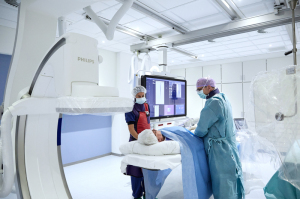by
John R. Fischer, Senior Reporter | July 28, 2023

A hospital in France and one in the U.S. have enrolled their respective countries' first patients in the WE-TRUST direct-to-angio suite trial. (Photo of Azurion system, courtesy of Philips)
The U.S. and France have officially become participants in the multicenter clinical WE-TRUST trial, a study evaluating the efficacy of diagnosing and treating patients back-to-back in a single angio suite.
The purpose of the direct-to-angio suite (DTAS) approach is to reduce delays in treatment, which decrease the chances of a good outcome for patients. It is centered around patients who have experienced a stroke in less than six hours and involves the use of a cone-beam CT (CBCT) imaging tool already integrated into interventional angio suite systems. For the trial, the specific solution being used is Philips’ image-guided therapy system, Azurion.
The Bicêtre Hospital in Paris used the approach in late July to remove a blood clot from a severe stroke patient within 30 minutes of being admitted to the hospital. Their condition greatly improved following the intervention. In Jacksonville, Florida, the Baptist Stroke & Cerebrovascular Center recruited the first patient in the U.S.



Ad Statistics
Times Displayed: 3029
Times Visited: 33 Fast-moving cardiac structures have a big impact on imaging. Fujifilm’s SCENARIA View premium performance CT brings solutions to address motion in Coronary CTA while delivering unique dose saving and workflow increasing benefits.
“By incorporating U.S. patients into the WE-TRUST (Workflow optimization to rEduce Time to endovascular Reperfusion for Ultra-fast Stroke Treatment) trial, we aim to help provide data and outcomes that will inform clinical workflows, that in turn (and more importantly), benefit patients across the globe,” said neurosurgeon Dr. Ricardo Hanel, director of the Baptist Neurological Institute, in a statement.
The prospective, randomized controlled trial will evaluate over 500 patients at 16 stroke sites in the U.S., Brazil, Argentina, the Netherlands, Germany, France, Spain, and Turkey. Vall d'Hebron University Hospital, in Spain, officially kicked off its start in July 2021 when it
treated the first patient with the DTAS approach.
The hospital was also part of a recent study that found that the technique, when combined with CBCT,
saved more than $3,000 per patient.
Numerous single-centered studies have shown its efficacy, including that scanning and prepping patients immediately in the cath lab saves more than 30 minutes, reducing risks for temporary and permanent side effects, as well as death.
Additionally, using CBCT better distinguishes intracranial hemorrhages from large vessel occlusions, enabling providers to immediately perform mechanical thrombectomies on patients with LVOs.

